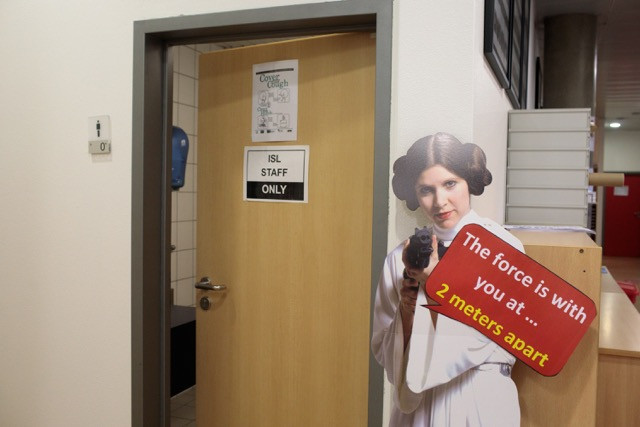From temperature checks at the entrance to one-way traffic in corridors and lunches eaten two metres apart, around 350 students from the private school had their first taste of life after lockdown, with a raft of new measures designed to curb the spread of coronavirus.
“I think they’re a bit like deer in the headlights. I hope as they see their teachers it will get easier for them,” acting school director and lower school principal Patricia Angoy told Delano, adding that it was thanks to staff who worked together to make it happen. “It’s a huge task […] It’s actually quite exciting to be back at school. To see the school. A school isn’t a school without students.”
The ISL has invested in four thermal body temperature cameras, two of which were in use during the first day to check the temperatures of students as they queued, two metres apart, in a reception tent. With a price tag of around €5,500 per camera, it was a considerable sum but not the most expensive on the market, head of facilities and security Steve Zeimes explained. The cameras test 45 students in three minutes and meant no-one was kept waiting outside in Monday’s unseasonably bad weather.
Once the camera confirmed they did not have a high temperature, students were issued a token that they placed in a box before entering the building. Markings on the ground indicated the one-way direction of foot traffic, designed to limit close contact between students. Students arrived in masks, which they kept on inside the school, in-line with the education ministry’s recommendations. They can only remove their masks if their teacher allows it in the classroom and in order to eat their lunch. The latter experience had also transformed. Hot meals are now replaced with packed lunches that parents order in advance. Students dine alone on single desks normally used for exams, each placed two metres apart. Just fifty students are allowed in the dining room at one time.
Similarly to the public school system, the student body has been split in two, with each cohort alternating weekly attendance in class. This, said upper school principle Iain Fish, was a big challenge. “We can’t do a straight 50-50 split in home rooms. We have to look at different permutations, and siblings. It’s been really complex,” he said. “The other real challenge has been for the teachers in terms of their own planning. They are expected to teach kids in class and support virtual home learning as well.”
He explained that the school has brought in substitute teachers to assist, and even replace teachers who are not able to return to school, either because they are vulnerable, live with a vulnerable person or have no other childcare options because of coronavirus measures.
There was one saving grace--the IB and IGCSE examination boards have been cancelled exams for this academic year. Final year students will be assessed based on previous work. As for graduation, usually a public occasion at the ISL, staff, students and parents are still discussing how to go about this without endangering health.
The next two weeks will be an opportunity for the school to fine-tune any issues before the lower school reopens on 25 May. Term ends on 26 June.
